Anime Review: Dororo
- Joseph Lutholtz
- Aug 4, 2019
- 11 min read

Alternative Names: Dororo (2019)
Score: 9/10, 5/5
Length: 24 Epsidoes
Genre: Action, Adventure, Drama, Supernatural, Pseudohistory, Samurai
Summary: For the sake of his nation's future, Daigo Kagemitsu offers up his newborn son to the demons that have long since plagued his land. With this offering, it is assumed that he will assure his people's prosperity and earn the demons' protection from any invading armies. In spite of his plans, however, something goes wrong just as the demons lay their claim on the newborn. In some twist of fate, they manage to steal the newborn child's eyes, ears, voice, limbs, and skin but not its soul. Because of this one, small blessing, the child manages to survive after being quietly disposed of by a maid and saved by a master of prosthetics, Jukai. Now, years later, the child named Hyakkimaru has decided to hunt the demons that stole his life from him. Blind, mute, deaf, and disabled as Hyakkimaru is, though, it doesn't take long for someone new to come to his aid. After being saved by Hyakkimaru, the young, surly orphan Dororo has taken it upon himself to be Hyakkimaru's guide, support, and anchor to the human world.
Review: As I have said in many reviews before, adaptation is a tricky process that can be the life or death of a series. In many cases, adaptation just means deciding how a manga or light novel can be chopped up into episodic pieces--stretching things here and cutting things there to make a semi-decent product--and then trusting that the production team will be able to make the most of what they're given. In very rare cases, however, adaptation can be a form of reimagining and rebuilding a title into something far greater than what it once was. Not to discredit the work Osamu Tezuka put into the original Dororo manga and anime that followed but MAPPA and Twin Engine's reimagining of Dororo is simply a superior work of fiction. The reason for the shift in quality isn't some ephemeral or subjective speculation this time around. Namely, the reason this iteration of Dororo is so much better can be attributed to the freedom the writing and production team was given with this property. With that freedom, they were able to make touches to the story here and there and overhaul the entire tone of the series to create something really special. Gone are all the pointless anachronisms, the awkward comedy, and the similarities to Tezuka's more childish titles like Astro Boy. In their place, we get a bleak, action-packed, but ultimately hopeful story that focuses on showcasing the tragedy of war and mankind's willingness to sacrifice one another for the sake of their survival or their honor and standing in a community.

Can you tell I'm excited to finally review this series?
Now, to be clear, not much about the show's actual premise and story beats have changed. The vast majority of the series still follows the adventures of series' disabled samurai, Hyakkimaru, and his rambunctious sidekick, the titular Dororo. Together they travel the Japanese countryside and slay demons in the hopes of getting Hyakkimaru's senses and limbs back. In this sense, very little has changed about the series. In every other sense, though, everything has changed. Several new segments have been added to this iteration that better fleshes out the backstory of Hyakkimaru, Dororo, and the rest of the show's leading cast. For example, the establishing moment of the series that sets the tone and justification for Hyakkimaru's revenge, his birth, is given an entirely new meaning. In the manga, Hyakkimaru's father, Daigo, is played off as comedically evil and power-hungry, giving no thought to his killing who stands in the way of his ambitions. In the anime, however, we are given a solid and understandable reason why Daigo seeks the aid of the demons. His kingdom is dying from famines and plagues that have made it nearly impossible for his people to go on living. With the demons' blessing, he believes that his country will flourish and is willing to sacrifice anything to make that happen. Also unlike the manga, though, it appears that Daigo does not actually know what the demons plan to take from him and is just as shocked as his wife when Hyakkimaru is born broken and senseless. This lack of knowledge and desire to save his land, of course, don't justify his actions. Quite the contrary; he is still every bit the monster he was in the manga. All these little changes do is making him into a much more believable monster. The difference is that actions can actually be rationalized or even appear sympathetic to the viewer and its that shift in context and tone that makes the series' beginning so much more compelling.

Even the priest that guards the Hall of Hell is given more purpose
than just being a nobody to kill off but more on that later.
This brand of expansion and dramatization of the original manga is more or less the running theme of MAPPA's Dororo. In almost every instance, every aspect of the show that was part of Tezuka's original manga has been fleshed and reimagined into something much more compelling. Rather than feeling like a shounen comedy or power fantasy, Hyakkimaru and Dororo's journey feels much more grounded in reality--a tragic reality, mind you, but reality none the less. Most every one-off and two-bit nobody from the original story has been given either had the comedy of their story stripped away or were given a backstory to make their struggles and deaths that much more meaningful. The same can be said of the series' main duo as well though. For all intents and purposes, Hyakkimaru is just as disabled as he originally should have been. Gone are his one-off gimmicks crafted into his prosthetics. Gone is his ability to just telepathically communicate--an ability that made no sense to begin with since he is both deaf and mute. Apart from his single-mind will to survive and the god-given ability to see the aura of those around him, Hyakkimaru acts and is restricted in the manner you'd expect of someone who lacks all his senses. Even when he starts gaining his bodily functions back, Hyakkimaru isn't magically able to just use his newfound senses. As you'd expect from someone who has never been able to hear or feel or smell, every new sense overloads his mind and causes him nothing but agony until he eventually acclimates to them. Entire episodes come and go where Hyakkimaru is rendered helpless and useless to those around him simply because he's struggling to adapt to a new facet of the world around him. Odd as it might be to say this about a series protagonist, he is every bit the beast people fear toward the beginning of the series.
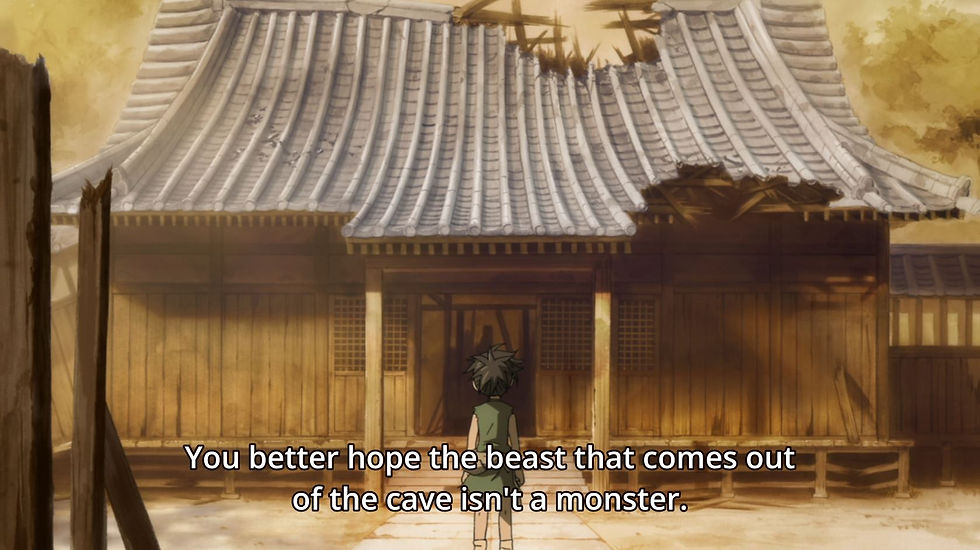
And it is that very fear that is the crux of Hyakkimaru's entire story.
Even when Hyakkimaru has gained enough of his senses to function like a somewhat normal human being, that fear of his more bestial nature lingers. After all, at the end of the day, Hyakkimaru isn't and could never be the bold or calculating warrior he is in the manga. Rather, he proves time and again to be every bit the monster his father is, though not by choice. Having been deprived of his senses all his life, it figures that Hyakkimaru would be emotionally stunted to some degree. So, like his father, he proves to be entirely self-centered and single-minded in his ambitions. For most of the series, he lacks the ability to empathize with other people and only ever works with them if they're willing to assist in his hunt. He even goes so far as to abandon or simply forget Dororo a few times throughout the series whenever Dororo starts to argue that they should give up hunting demons. The key difference to note, though, when comparing Hyakkimaru and Daigo's actions is that Daigo's actions are intentionally callous and malicious. Whereas Hyakkimaru's crueler moments are simply the result of his disabilities and utter lack of self-awareness. In many ways, he is little more than a child in a man's body, one that hasn't yet learned to control his anger and is furious whenever something is taken away from him, whether that be his lost pieces or another person.

Keep in mind, however, that his immaturity doesn't mean he'll always be incapable of malice.
Oddly enough, despite all the changes the rest of the cast sees in this series, Dororo's role in the series hasn't changed all that much. Their childish whiles might be so basic as they once were but they are still very much the crux of series' emotional power and the source of what little comedy is still present. It's bad enough that Hyakkimaru's bloody and gruesome revenge quest puts them in danger but the fact that a child is forced to fight for their survival only makes the show's darker moments that much darker. Though Dororo's eyes, we see samurai butchering entire villages, bandits preying on any easy target they can find, and demons devouring peasant and noble alike. Nothing and no one is spared from the suffering war inflicts on a nation and Dororo sees much more of humanity's darker nature than their potential to do good because of that. Yet, to make matters even worse, is forced to deal with all of this on top of the constant fear of being abandoned again or that the only friend he's ever had will end up becoming the very thing they're hunting--a demon. Harsh, unforgiving, and tragic as Dororo's perspective is, they are also one of this show's few sources of hope.
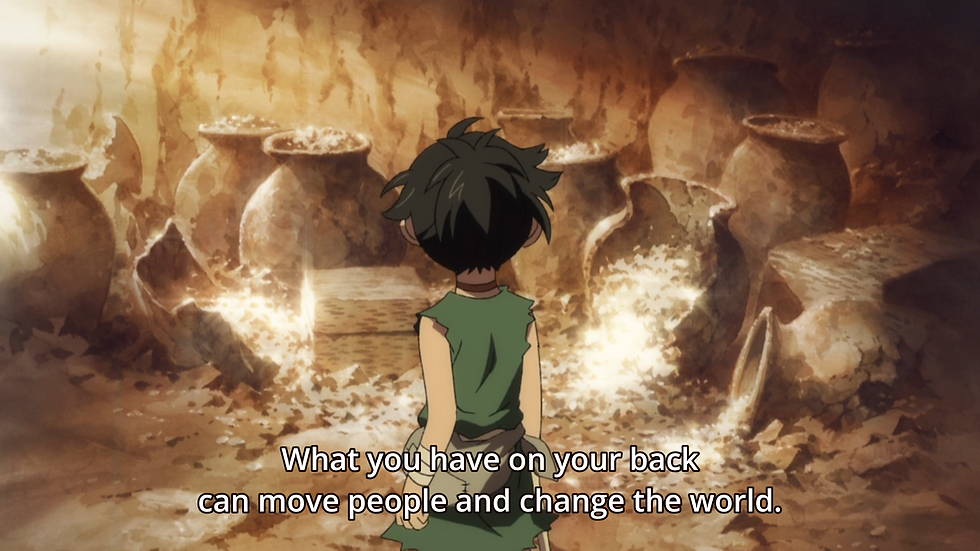
In a very literal sense, Dororo carries the weight of the world on their back.
Childish, ill-tempered, and selfish as Dororo might be, they are the only thing stopping Hyakkimaru from abandoning his humanity altogether. Obsessed as Hyakkimaru might be, Dororo's guiding hand keeps him grounded. Through Dororo, Hyakkimaru steadily learns how to be human, all while their adventures foster in Dororo a strong sense of justice and empathy for the downtrodden. As they see towns fall apart and people turn on one another, Dororo watches and considers how things could have gone better. Rather than just blindly following Hyakkimaru and committing theft wherever possible, Dororo is often forced to pause and question if what they're doing is worth the risk. This line of thinking obviously puts Dororo's dreams at odds with Hyakkimaru's ambitions but, as we learn repeatedly throughout the series, that might not be such a bad thing. If Dororo can learn to find a middle road where both Hyakkimaru and the people around them can be saved, then there's a good chance that they might be able to change this cruel and callous world for the better.
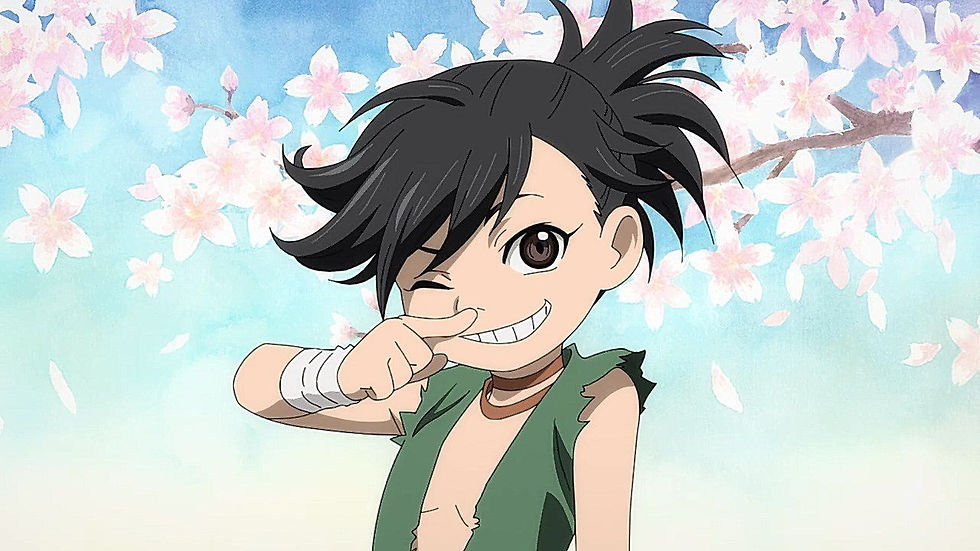
It's almost like there's a reason Dororo is the titular character of this series and not Hyakkimaru.
It should be said, however, that this focus on learning to strike a balance between mankind's darker and better halves isn't the show's only narrative throughline. Long before it can even begin to touch on that final line of thought, the series first needs to explore the depths of those two halves and define what it means to be human. Of course, most of this narrative is explored through Hyakkimaru's story as he finds himself treading a fine line between being human and becoming a demon. As he learns to be human by following both Dororo's lead and his instincts, Hyakkimaru is forced to consider where lines between good and evil should be drawn. Whether its a demon that has no intention of harming other people or a human so warped by their greed, hatred, or ambition that they become little better than a demon, Hyakkimaru has to define for himself when right or wrong to kill another living being. Then, as things take a turn for the worse, he is forced to apply those definitions to his own existence. When he learns the truth of why he fell prey to the demons, for example, he begins to question if it would then be right for him to raze Daigo's land in retribution for what his father did to him. Yet, having learned that killing another person can stain the soul and makes him that much closer to being a demon, he has to weight whether seeking vengeance on Daigo would be worth losing what makes him human.
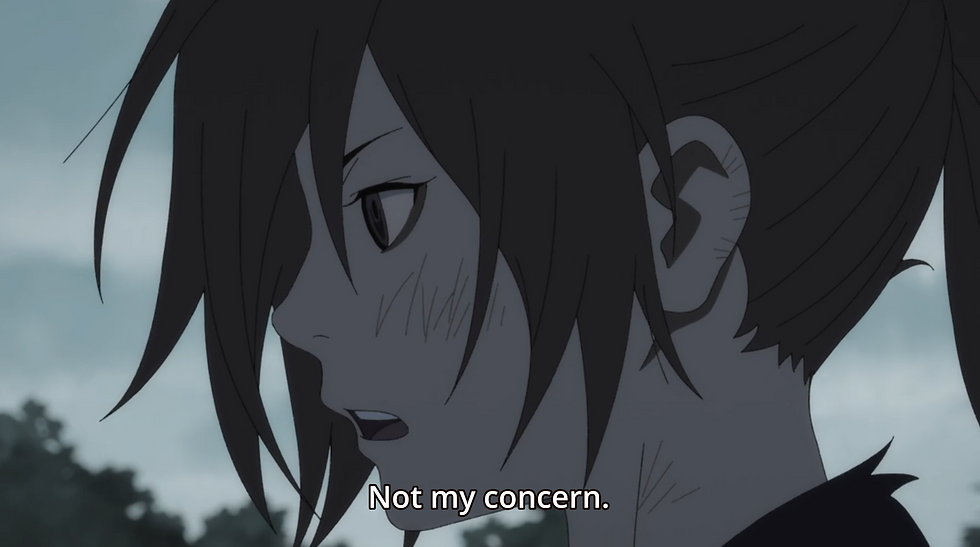
Simple as that choice might sound for most, keep in mind that Hyakkimaru is still in the process
of learning basic morals, empathy, and the consequences of his actions.
Compounded on those lessons of learning to do good rather than cave to one's darker nature, Dororo also works to explore what role blood and fate might have on a person's darker and better natures. As I have mentioned already, certain similarities can be drawn between Hyakkimaru's childish rage and Daigo's malicious actions. Yet, as these two clash and Hyakkimaru's troubled brother, Tahomaru, is drawn into the conflict, this concern is made all the more relevant. Offering yet another example of how well this series improved on the Tezuka's original work, Tahomaru is elevated from being a meaningless one-off character to becoming the central figure of one of the show's larger narratives. Through him, we are offered a much clearer picture of what Daigo has to deal with as the lord of a kingdom. Though his rise to prominence might have simply been born from his pride, it is still a lord's duty to look after his land and its people. Warped as Daigo might be, we still see signs of that obligation through a similar kind of self-centered dedication to the nation in Tahomaru. While his actions might be fueled by his longstanding inferiority complex and jealousy toward Hyakkimaru for being at the forefront of their mother's mind, Tahomaru still works to secure his people's safety and prosperity. Before he even learns the truth of who Hyakkimaru and what their father had done, Tahomaru proves his worthiness to rule as he rallies to people to slay one of the 48 demons. As soon as he learns the truth, though, Tahomaru gives in to his darker desires the same way Daigo did in the very beginning. Then, just like that, the goodness of his noble obligation is either forgotten or twisted to better suit his darker, selfish desire to kill Hyakkimaru "for the good of the nation."

While Hyakkimaru, for his part, is more than willing to take his anger at Daigo
out on the boy who has everything he was denied.
To summarize all of this neatly, it's an objective truth that MAPPA's Dororo is better than Tezuka's original work. That might sound like a jab at the father of manga but make no mistake that I respect the author and his original work. For its time, the Dororo manga was unique and special, particularly because it was made during one of Tezuka's transitional periods. Yet, despite my respect for the man, I don't think it can be argued that this anime managed to draw out the manga's better parts and expanded them into something special. Of the three major narratives that I detailed in this review, several more sit easily in plain sight and are worthy of discussion. As I've said before, though, quality of narrative doesn't always correlate to overall quality. While I am undoubtedly inclined to love this show and what it has to offer, I'll also be the first to admit that it's far from perfect. Powerful and meaningful as the new bits of context and details are, not every change and anime-original story was perfect. Particularly during the show's second half, when it explores various connections human have with demon-kind, the plot and narrative start to drag and lose focus.
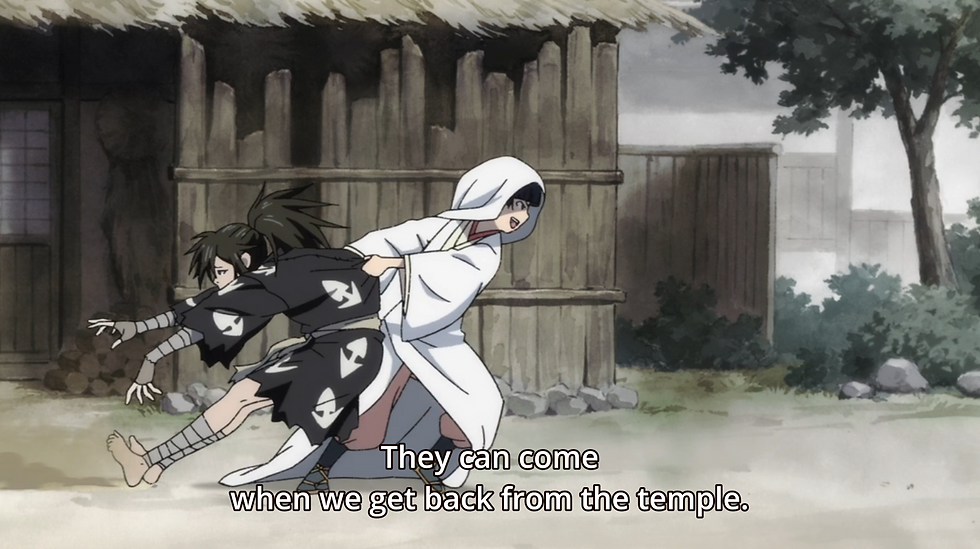
Looking at you, shotgun wedding episode.
Normally, such low points would be forgivable in an episodic series but they, unfortunately, only start to crop up just as Dororo's story starts to pick up steam in the larger narrative, dragging the impact of that arc down in the process. On a similar note, the series struggles to hone in on what it wants to do with Dororo. Whether it's firmly deciding who Dororo is and what their relationship with Hyakkimaru will be like in the years to follow, the series puts itself in a position where there can't be a right answer. Yet, as the series starts to wrap-up a lot of contradictions begin to crop up and several of the writers' last-minute decisions ended up leaving a sour taste in my mouth. Add those complications on top of the various subtitle errors that dotted the series and several moments where it became obvious that the studio was running low on funds, and you've got a good deal of evidence to prove that a show was far from being "perfect." Nitpicking aside, though, I simply cannot recommend Dororo enough. It might not have earned the honor of being a "masterpiece" in my eyes but it is, without a doubt, one of the best shows I've ever seen. Put bluntly, I have no qualms about putting it up there with shows like Samurai Champloo or even Bebop but that might simply be a matter of taste for me. It's entirely likely that the show's edgier moments will turn some people away. Others might find the brotherly feud between Hyakkimaru and Tahomaru as frustrating as it was in Sirius the Jaeger. And, of course, there's always the possibility that Dororo will grate on the nerves of those who just can't stand child characters. Valid as those issues might be for some, I still feel like I can give Dororo a blanket recommendation to everyone willing to watch it. After all, it's rare for an adaptation to surpass the quality and merits of its source material.


Comments